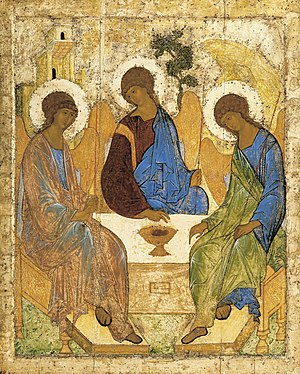| Andrei Rublev's Trinity, representing the Father, Son and Holy Spirit in a similar manner. (Photo credit: Wikipedia) |
Here is a sample of what McLaren wrote:
At the heart of Social Trinitarianism is the concept of perichoresis, which images God as a dynamic unity-in-community of self-giving persons-in-relationship. The Father, Son, and Spirit in this view are not three independent units (or monads) eternally bound together in a larger unity. Nor is God one independent unit with three identical parts. Rather, each person exists in dynamic social relationship with the others, and God is the relational unity in which they relate.
Similarly, the being of one person of the Trinity is not independent of the being of the others, so that one could be subtracted and the other two would stand. Nor does the being of one person stand over against the being of the others so the Father could be defined as “not the Son or the Spirit” or the Spirit as “not the Father or the Son,” and so on. Rather, the very idea of person — whether applied to human beings or to the Father, Son, and Holy Spirit — is redefined in Social Trinitarianism as “being in relationship.” A person’s relationships with the others, in other words, aren’t an accessory to the person who exists apart from them. Those relationships are what and who that person is, and that person cannot be said to exist apart from those relationships. Being, then, for God as for us, means interbeing, being in relationship, so the three persons of the Holy Trinity are not merely one with each other: they are one in each other.
...
[I]magine (recalling the previous paragraphs) God as a “being as communion,” as a loving trinity of perichoresis, a sacred choreography of self-giving, other-receiving; honoring, being honored; fully seeing the other, fully revealing the self. Imagine an eternal one-anotherness who is by nature non-assimilating, non-isolating, non-dominating, non-eliminating, non-overthrowing, non-competing, and non-victimized or -victimizing.
Now imagine this God self-expressing in a universe. What kind of universe would this kind of God create? It would not be a universe of independent, isolated individuals or monads because God is not an independent, isolated monad. It would not be a universe of undifferentiated homogeneity (as in the domination, purification, and assimilation narratives) because God is not an undifferentiated homogeneity. It would not be a universe of unending rivalry leading to competition, revolution, and victimization either, because God is not many-in-conflict but three-in-one, unity-in-community. It would not be a universe of duality, stuck in the conflict of one versus the other, because God is one: one one-another....Imagine that vision of the Holy Trinity and how it could convert its holders from their hostile old identities to a robust, energetic, harmonious new identity. God-with-God in community leads us to envision God-with-us in community. And that vision in turn dares us to imagine God-with-them in community. And that expansive vision invites us higher still: to envision God-with-us-and-with-them in community, which leads us further still to envision us-with-them in community. This approach to the Trinity need not be a litmus test used to legitimize us and delegitimize them. Instead, it can be a gift, offered to others like a poem, not an ultimatum — given not to require assent or dissent, but to inspire mutual love and respect.
I am not trying to make a full and direct equivalence here between this view of the Christian Trinity and the notions of emptiness and it's correlates (impermanence, no-self, dependent co-arising) but it does offer a good opportunity for meaningful dialogue and mutual respect between Christians and Buddhists as well as Christians and people of other religious views. Additionally this view of the Trinity is much closer to the vision of Christianity described on this blog than anything else out there that I have run across thus far. It honors and celebrates unity and diversity and help fulfills the vision of thinkers such as Raimon Pannikar (emphasis added):
Panikkar did not confuse or conflate historical contingency with spiritual truth. In Hinduism and Buddhism Panikkar found other languages, in addition to Biblical Hebrew, Greek philosophy, and Latin Christianity, to express the core convictions (the kerygma) of the Christian tradition.
Christ and his teaching are not, so Panikkar argues, the monopoly or exclusive property of Christianity seen as a historical religion. Rather, Christ is the universal symbol of divine-human unity, the human face of God. Christianity approaches Christ in a particular and unique way, informed by its own history and spiritual evolution. But Christ vastly transcends Christianity. Panikkar calls the name "Christ" the "Supername," in line with St. Paul's "name above every name" (Phil 2:9), because it is a name that can and must assume other names, like Rama or Krishna or Ishvara.
In his words, "To the third Christian millennium is reserved the task of overcoming a tribal Christology by a Christophany which allows Christians to see the work of Christ everywhere, without assuming that they have a better grasp or a monopoly of that Mystery, which has been revealed to them in a unique way."
–Joseph Prabhu on the life and work of theologian Raimon Panikkar



No comments:
Post a Comment
Hello! Thanks for leaving a comment.
Everything but spam and abusive comments are welcome. Logging in isn't necessary but if you don't then please "sign" at the end of your comment. You can choose to receive email notifications of new replies to this post for your convenience, and if you find it interesting don't forget to share it. Thanks!